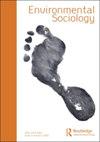Walking the talk on research and publication ethics
IF 2.4
Q3 ENVIRONMENTAL STUDIES
引用次数: 0
Abstract
Exposing injustice and inequality is a raison d’être for sociology. Environmental sociologists interrogate not only the social and economic causes of ecological crises but the violence perpetuated on communities via ecosystem disruption and natural resource depletion. Through our engagements with communities, social movements, multidisciplinary research programs and policy-makers we seek to uncover, to explain and, most of all, to transform, destructive social-ecological relations through positive social and environmental change.行走在研究与出版伦理的谈话中
揭露不公正和不平等是社会学存在的理由。环境社会学家不仅质疑生态危机的社会和经济原因,还质疑生态系统破坏和自然资源枯竭对社区造成的暴力。通过与社区、社会运动、多学科研究项目和政策制定者的接触,我们寻求通过积极的社会和环境变化来揭示、解释,最重要的是,改变破坏性的社会生态关系。
本文章由计算机程序翻译,如有差异,请以英文原文为准。
求助全文
约1分钟内获得全文
求助全文
来源期刊

Environmental Sociology
ENVIRONMENTAL STUDIES-
CiteScore
4.60
自引率
12.00%
发文量
34
期刊介绍:
Environmental Sociology is dedicated to applying and advancing the sociological imagination in relation to a wide variety of environmental challenges, controversies and issues, at every level from the global to local, from ‘world culture’ to diverse local perspectives. As an international, peer-reviewed scholarly journal, Environmental Sociology aims to stretch the conceptual and theoretical boundaries of both environmental and mainstream sociology, to highlight the relevance of sociological research for environmental policy and management, to disseminate the results of sociological research, and to engage in productive dialogue and debate with other disciplines in the social, natural and ecological sciences. Contributions may utilize a variety of theoretical orientations including, but not restricted to: critical theory, cultural sociology, ecofeminism, ecological modernization, environmental justice, organizational sociology, political ecology, political economy, post-colonial studies, risk theory, social psychology, science and technology studies, globalization, world-systems analysis, and so on. Cross- and transdisciplinary contributions are welcome where they demonstrate a novel attempt to understand social-ecological relationships in a manner that engages with the core concerns of sociology in social relationships, institutions, practices and processes. All methodological approaches in the environmental social sciences – qualitative, quantitative, integrative, spatial, policy analysis, etc. – are welcomed. Environmental Sociology welcomes high-quality submissions from scholars around the world.
 求助内容:
求助内容: 应助结果提醒方式:
应助结果提醒方式:


